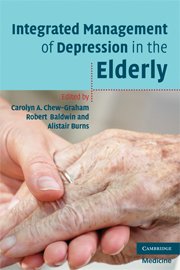Book contents
- Frontmatter
- Contents
- Contributors
- Foreword
- Preface
- Acknowledgements
- 1 Late-life depression: an introduction
- 2 Management of late-life depression
- 3 Management of late-life depression in primary care: case studies UK
- 4 Management of more complicated depression in primary care: case studies UK
- 5 Management of late-life depression across primary and secondary care: case studies UK
- 6 Management of late-life depression around the world: summary of international commentaries
- 7 Resources
- Appendix: International commentaries
- Index
- References
5 - Management of late-life depression across primary and secondary care: case studies UK
Published online by Cambridge University Press: 18 December 2009
- Frontmatter
- Contents
- Contributors
- Foreword
- Preface
- Acknowledgements
- 1 Late-life depression: an introduction
- 2 Management of late-life depression
- 3 Management of late-life depression in primary care: case studies UK
- 4 Management of more complicated depression in primary care: case studies UK
- 5 Management of late-life depression across primary and secondary care: case studies UK
- 6 Management of late-life depression around the world: summary of international commentaries
- 7 Resources
- Appendix: International commentaries
- Index
- References
Summary
In the next three case commentaries we asked our contributors to comment on more complicated cases where input from both primary and secondary health care and social care would be necessary.
Depression with psychotic features
Mrs Paulette B is an African-Caribbean lady who came over to the UK 50 years ago with her husband. She raised six children who have all done very well and all except one live in different parts of the UK. When her husband died, Mrs PB threw herself into her work with the local church, helping run a group for young women and teaching in the Sunday School. For the last three months she has been off her food, unable to concentrate, less interested in things and reluctant to go to church, fearing that she will bring some calamity onto the congregation.
In the last two weeks, she has been aware of a man's voice warning her to stay at home and to avoid answering the telephone as her thoughts will be recorded. Initially she thought this might be her husband's voice but has now become convinced that it is the voice of the vicar and so when he called on her last week, she spoke to him through the door. She told him she knew that she had committed ‘the unforgivable sin’.
- Type
- Chapter
- Information
- Integrated Management of Depression in the Elderly , pp. 83 - 101Publisher: Cambridge University PressPrint publication year: 2008



